THR’s Blackfamous Roundtable: Revered and Underrecognized at the Same Time — The Duality of Fame in Black Hollywood
- Oops!Something went wrong.Please try again later.
- Oops!Something went wrong.Please try again later.
- Oops!Something went wrong.Please try again later.
- Oops!Something went wrong.Please try again later.
- Oops!Something went wrong.Please try again later.
- Oops!Something went wrong.Please try again later.
- Oops!Something went wrong.Please try again later.
- Oops!Something went wrong.Please try again later.

When you survey the landscape of the world’s most recognizable faces, you’ll find the likes of Beyoncé, Oprah, Will Smith, Michael Jordan, Rihanna, Denzel Washington and more.
Black. Famous.
More from The Hollywood Reporter
Taraji P. Henson Joins 'Abbott Elementary' in Major Guest Role
Critic's Notebook: Capitalism and TV Today, a Love/Hate Story
Blackfamous, however, has come to represent something different: an example of how the perspective of celebrity shifts depending on which world you inhabit.
It can mean starring in films that have reached iconic status in the Black world (Love Jones, Eve’s Bayou, Waiting to Exhale) yet are rarely mentioned as classics in a mainstream world. It can mean starring in series that can alight Black Twitter each week (like Power Book II: Ghost) but aren’t enveloped in wider conversations. And it can mean having to go incognito in your own community because you’re that famous — while going unnoticed in another realm. “It’s always either one extreme or the other,” muses Loretta Devine on the duality that has come to define fame for many in Black Hollywood.
Devine may be the epitome of a Blackfamous actor: an Emmy winner whose credits stretch from P-Valley to A Different World, who was part of an Oscar-winning cast in Crash, a scene-stealer in films like Exhale and This Christmas and is still, in some ways, operating under the radar.
Yet when The Hollywood Reporter gathered Devine, Lynn Whitfield, Larenz Tate, Sheryl Lee Ralph and Wendy Raquel Robinson for a roundtable to talk about the paradox, the conversation was not marked by feelings of frustration, but of celebration. To be sure, a large part of it was the sense of a reunion among its participants: All had worked together or known each other for years in some fashion, and before the discussion got underway, Ralph (who is perhaps enjoying some of her biggest success in years with the hit ABC comedy Abbott Elementary) and Tate (also in Crash) reminisced about how the pair worked together on a sitcom called New Attitude back when he was just a kid.
The virtual panel discussed the hurdles and challenges Black actors face that can limit opportunities, but in the fun, freewheeling conversation, they relished the celebration of their work in Black spaces, progress that has made it possible for others to leap over hurdles, and how being Blackfamous has given them perhaps their dream careers.
What does the concept of “Blackfamous” or “Black fame” mean to you?
SHERYL LEE RALPH Well, it’s so interesting that you bring that up, because about two, maybe three years ago, I did a series called Fam for CBS. And one of the executive producers came up to me, because the network and somebody else had said, “No, this is the person.” So he walked right up to me on that first day, and he said, “So tell me, what have you done?”
Wow. Wow. Wow.
RALPH And I was like, “Well.” And then, I was quiet and he said, “Do you sing?” And I said, “Whoa.” So then I just said, “Excuse me for a minute. But maybe you should ask somebody, because you might be very embarrassed that you asked me that question, and I want us to get off on the right foot together.” So even in unsuspecting places, that can be very much a thing where there are certain people who have no idea who you are and what you’ve done after all these years.
LORETTA DEVINE Listen, I was in Serving Spoon [a Southern food restaurant in Inglewood, California] yesterday with the Rams and the 49ers [game], and Channel 5 was there, with my picture on the wall. And they were clueless. After we finished eating, all the younger [people] came on and said, “Ms. Devine, can I have a picture with you?” And they were like, “Who the …? Why?” And we got up and left. They were clueless. They didn’t put us on film. They filmed the people behind. It was so funny.
WENDY RAQUEL ROBINSON Wow.
DEVINE But if you are lucky enough to be in something that’s a mixed [race project] — I was in Grey’s Anatomy and I had to get used to having fans from other races after that started. So everything is changing and life is so different now. I mean, I don’t know what to do about the changes, but you do kind of laugh at it, you know?
ROBINSON Yeah. You have to laugh. I mean, for me, even within our community: I have fans that know me from The Steve Harvey Show that haven’t even seen The Game, and that’s been about 18 years of my life, you know? So it’s really interesting. The roles that you get noticed for, and then the ones that are just like — just going back to what Sheryl Lee was saying — it’s like, “Now, how long have you been in [the industry]?” And it’s like “Hmm?” So I guess that’s what keeps us so humble.
RALPH That’s the truth.
LARENZ TATE And as artists, we’re always trying to evolve, we’re always trying to do something a little bit different, and it would be nice if Hollywood could have more opportunities for us to be able to expand so people can know us from a variation of things. But it’s interesting as I see all of you amazing artists, and fame is a big thing, but what I see here is the work ethic that you all have put in. What we see here, just an incredible amount of talented and graceful artists who are famous. And it’s sad that sometimes we get caught up: People may not recognize us for the things that we feel so proud of, right, with the things that we’re so excited about, and it happens. But the real people know Loretta. The real people know Sheryl, the real real people know. So that’s what’s important.
DEVINE Fame is so tricky, I think, because I just found a store that I’ve never been in and I loved it, but I can’t go back because the guy at the cash register went ape because he went, “Oh my God!”
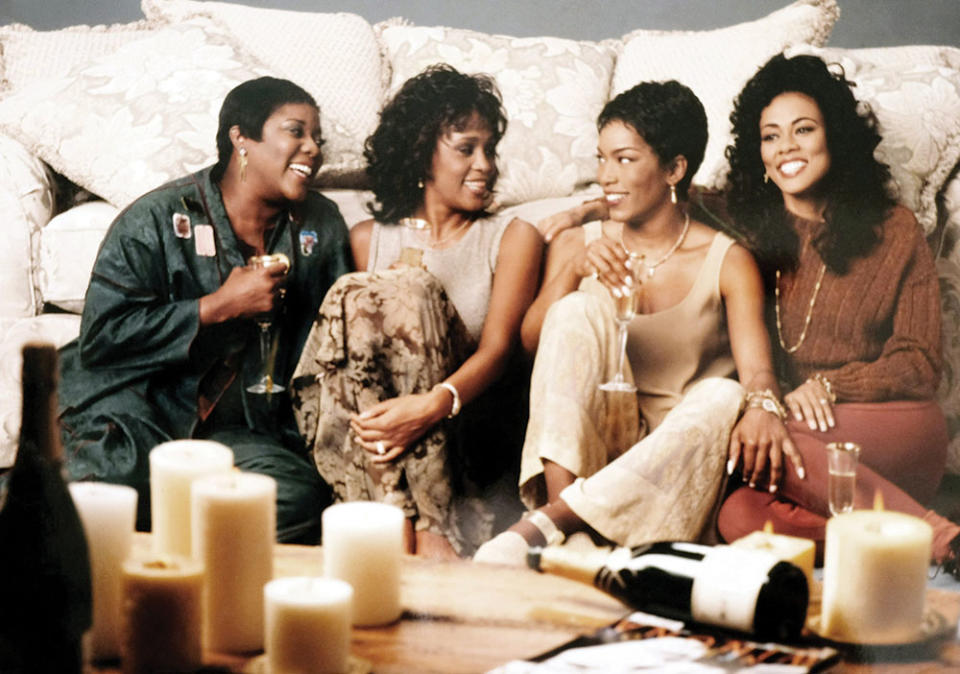
TATE Sometimes you just want to go into the store and shop without people going crazy.
DEVINE “I grew up on you. And I’m going to call my mom. My grandmother loves you.” It’s like, watch out now, you getting deep. It’s always either one extreme or the other.
LYNN WHITFIELD You know, I think it really has a lot to do with how particular shows are marketed to particular demographics, right? And so, you have a show, which Loretta just alluded to that, if it’s an all-Black cast, then so often that show is marketed for the Black audience.
DEVINE Right.
WHITFIELD There’s no consideration that people of other races might be appreciative of the artistry of the show. So it all gets marketed a certain way. It gets marketed through radio, it’s marketed for the Black audience. And I think that’s an assumption that networks make. So it’s really very rarely that there’s an all-Black show that gets pumped and pushed out to everyone. And I didn’t know it as much until there was Netflix, right? So now, for instance, Greenleaf was first on OWN, and then it carried on Netflix. Right?
DEVINE Right.
WHITFIELD And so there are so many women of so many races and cultures who saw this show, who were like, “Yes, wow, Lady Mae” [Whitfield’s protagonist], because every woman wants to realize their power within their lifetime. Every woman sees that when you put your career aside for family and all of that, and then start to step into your purpose. So I’ve had, all over, places in Europe and Brazil love that show. And so now with streaming, I think we have more of an opportunity to have other audiences join in. And we need to be really conscious that we ourselves have to try to put our stories on platforms where people really will partake of it, because it’s a choice. They can scroll through and say, “Ooh, that looks interesting. Maybe I’ll check that out.” We haven’t had that so much as Black storytellers, African American storytellers. It’s all, they tell people what they should watch.
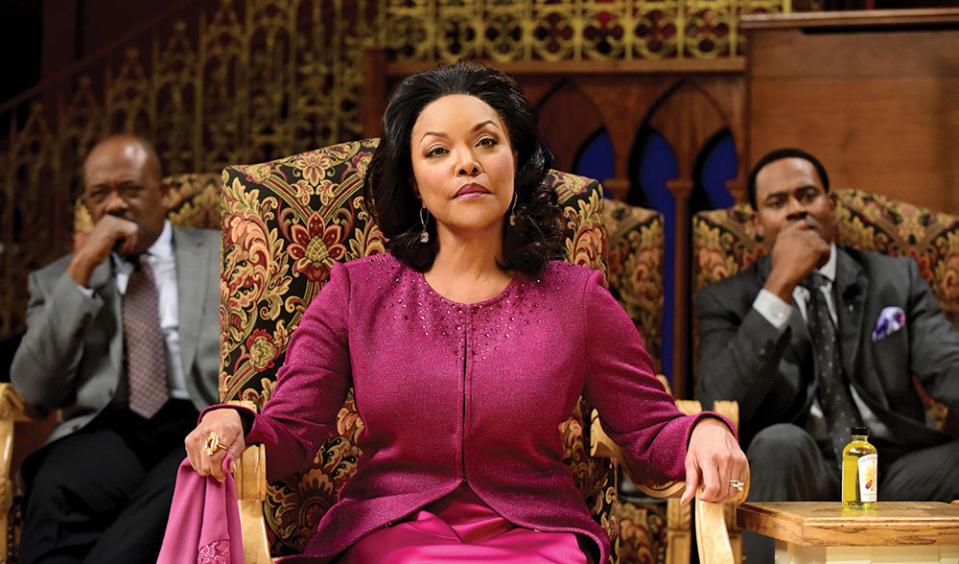
RALPH But I’m also seeing with streaming that marketing, marketing, marketing is everything. Because even in streaming now, the way they line up the shows to tell you what are the picks, what you should be watching. Once again, there become these new pigeonholes, but you know, it’s interesting because I see a little bit of the opposite. I’ve been doing this show for the past three years called Motherland: Fort Salem, where I play the 45th president in an alternative world of the United States of America. Incredible series about the feminine power. Nobody knows it’s there.
ROBINSON Wow.
RALPH Marketing, marketing, marketing. On the flip side, while I was doing that show, I was also doing Ray Donovan. Toward the end, I was doing Abbott Elementary. Then it’s like, boom, boom! Two very different audiences, but the way those shows are marketed once again goes back to “Who gets to see you?” What kind of famous do you become? Blackfamous or just famous famous?
TATE If I could add on to what both Lynn and Sheryl are saying, I think a large part of it has to do with who’s in the room, and the representation in making those decisions in those marketing rooms. Are they people who look like us, who understand, or as I would say, overstand our value, and the fact that we tell stories that are not monolithic? So it doesn’t mean that these are specifically just only for Black [American] folk, right? We can certainly be global. And when you have a streaming platform that really gets behind what you’re talking about when it comes to marketing, you see the effects when you travel abroad and you see everybody who knows who you are.
Historically, Hollywood has always taught us we don’t translate overseas. But when you start traveling and you can’t walk down the street, you then know that there’s been somebody telling you something all along that’s wrong. And my true belief as to why they do it is because Hollywood likes to sort of devalue Black artists and Black folk, because you get super talented people at a discounted rate. Only certain superstars can hit that level that they feel like they would put a machine behind them. But the truth of the matter is that we do translate, because we are humans just like everyone else. If you just allow us to tell the stories, right? If you just understand that we can relate to people who may be going through something: A mother is a mother, no matter what. Human experiences really transcend color and race. Now, we get specific when it comes to our stories, but it still can translate. And it really comes down to Hollywood having some real inclusion with people that look like us who can make the decisions in those rooms, those marketing rooms and PR rooms and boardrooms, all the way down, and greenlighting projects that we know should be told. I mean, we can spend a lifetime of all our careers telling a variation of stories.
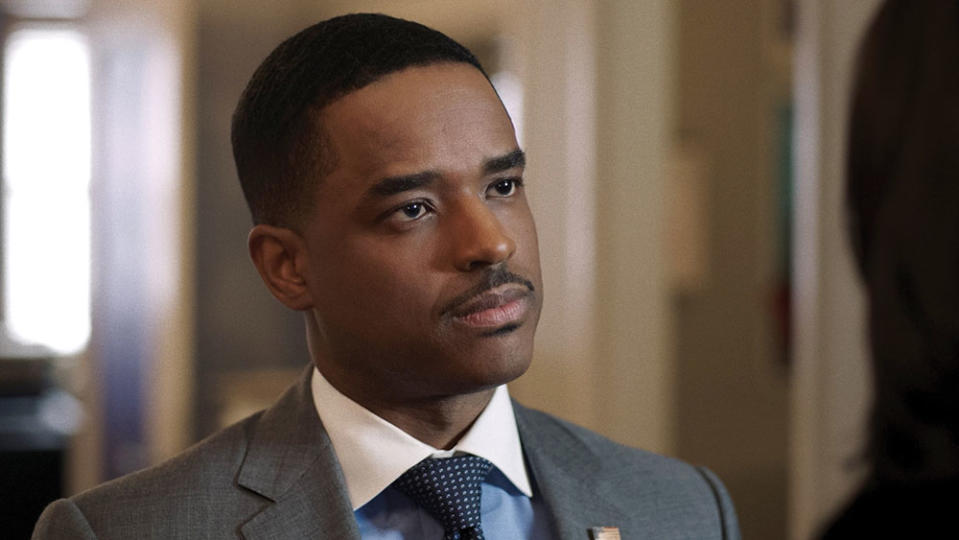
RALPH It’s so interesting. You talk about Netflix once again and our popularity, once people see us. When Moesha hit Netflix, I was like, “Whoa, this is incredible.” It was like a whole other generation from around the world. They were like, “I love this show.” And I’m like, “Baby, that show is 25 years old.”
ROBINSON I want to talk about that also. Even with The Game, when we hit Netflix, it was the same thing. It became multigenerational. And what I’m seeing now with Paramount+, they did a huge marketing campaign, more than I’ve ever seen in my entire career. But it was very intentional also. It’s inner city. It’s Atlanta. It’s Crenshaw, when I’m in L.A. New York, we were in Times Square. So I think the broader we are with the marketing, the more eyeballs we can get, because it’s a great show, and everybody’s like, “I’ve never seen this show until it was on Paramount+.” But we have been on three different networks.
DEVINE There are more Black shows now than I have ever seen in my life, with brand-new young people. You can’t imagine how much they’re paying them. And it’s like four or five [shows]. Everybody is including the new woman, the new director who’s never directed before and maybe should not be directing, but is. But nobody says a word about it because we must get these things done, because of the racism and the problems in this country already built into the system. All the things to keep you down as a race are already built into the structure of the United States of America. So you have to do these things that must be done. You’ve got to give people breaks. You’ve got to let us in.
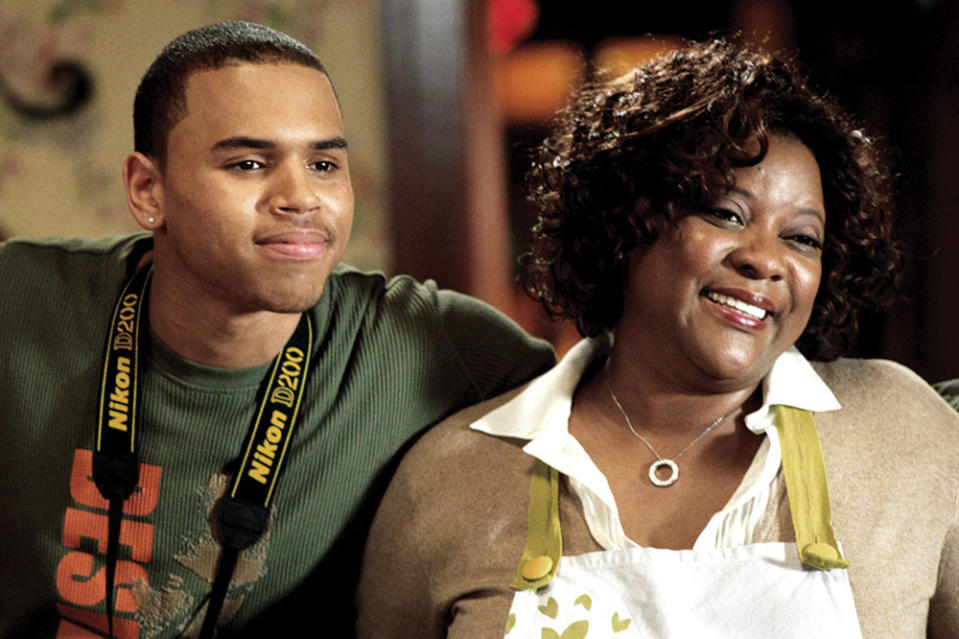
WHITFIELD I’m so excited about Issa Rae with Insecure, that it actually started on YouTube [the inspiration was Rae’s Awkward Black Girl], on a tiny screen, and how she platformed it all and how working with HBO, [she’s been] very specific, very authentic to our people. So that’s very encouraging. That’s just like the doors, the opportunities opening, and seeing the viability of it. And it’s clear, without a doubt, it has been a successful show.
ROBINSON And she’s passing the torch to so many new directors and writers and producers that are doing things. And even the series that she has that have [been talked about as having] spun off of Insecure have prompted so many other things.
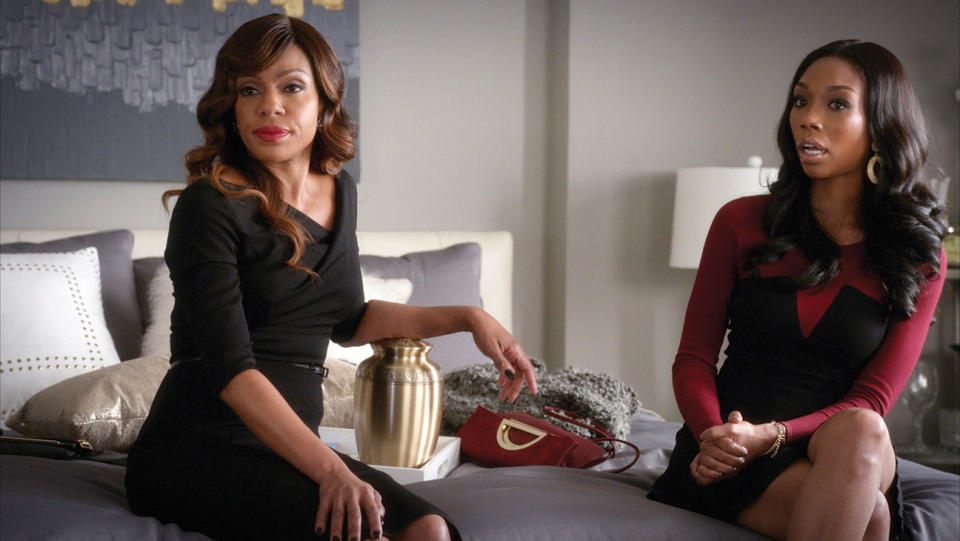
WHITFIELD That makes me hopeful, though. All these young content creators, Black content creators, women, directors, artists. I’m excited about that, and to take the authority to actually say, “This is my story, this is how we really are.” And for an HBO or whatever the platform, to see the viability of it. And then it just becomes a universal story. Because Larenz, what you were saying is that yes, our stories are so universal. Love lost is universal. Life lost is universal. Betrayal is universal. Audiences should be able to see and decide.
RALPH I love the fact that we’re talking about raising up what this next generation has been able to accomplish. And it’s not without what a lot of us went through at the very beginning. I want people to understand that there was heavy lifting done in the ’60s, ’70s, ’80s to get to the ’90s. And these 2000s. When I think about what Mr. Poitier, Diahann Carroll, Eartha Kitt … They wanted to blackball Rosalind Cash because she dared to [wear an Afro].
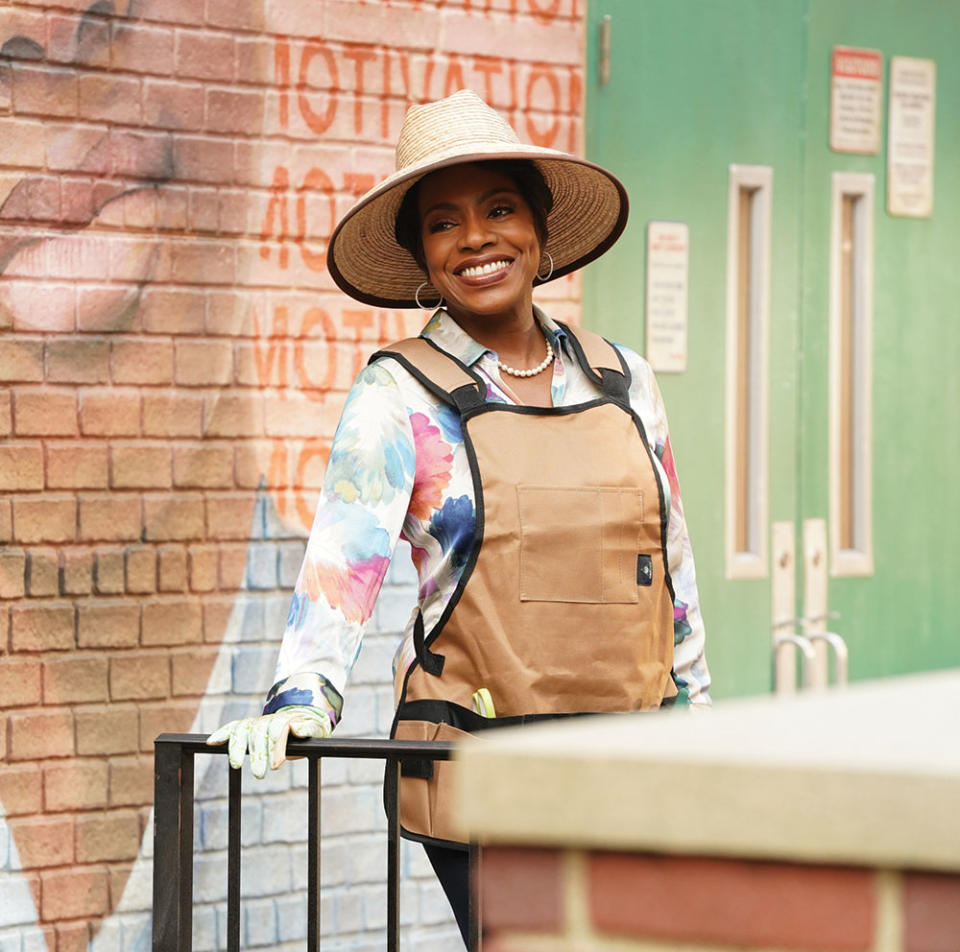
WHITFIELD Diana Sands.
RALPH Diana Sands when she said, “I’m wearing my Afro. This is who I am.” You know? When I think about what they did, the ’50s and the ’60s, when I think about the ’70s, the audacity of blaxploitation to tell a whole other story, to at least shine some light on us, whether you agreed with that era or not. It sure did put together new talent. When I think about the ’80s, the ’90s, and how there was a time when we owned TV in certain slots. When I think about that, and then I think about an Issa Rae. I think about Lena Waithe. I think about 50 Cent. I think about my special little Abbott Elementary queen there in Quinta Brunson.
And I am thrilled that from generations, we have become a bit stronger. We have become a bit more audacious. We had parents, aunties, who knocked down doggone doors because they told us there was no room in this industry for us. You had to be a certain shade. You had to be a certain size. You had to have a certain texture of hair. That’s what they told us. They told us we were too Black. They told us we were not Black enough. They told us we don’t talk Black. They told us we don’t know how to be Black.
But now, we have young people writing our stories with authenticity. That’s some family work. That’s some persistence. And I’m happy that Hollywood, in some ways, is paying attention.
ROBINSON You know what I want to say? It was when I saw you, Sheryl Lee, in It’s a Living. It’s when I saw you, Lynn Whitfield, as Josephine Baker. It’s when I saw you in Waiting to Exhale, Loretta Devine. And Larenz, yes, it’s when I had a crush on you in every damn movie that you in.
But it just inspired me. It inspired me to keep going. It’s like how we see the Issas and how we see the Lena Waithes coming up, just all the hope that it’s given. But know that all of you right here inspired me to just keep going when it wasn’t the easiest thing. I didn’t know anybody. I wasn’t cute enough to be the lead, but, OK, I was cool enough to be the best friend, or I just didn’t fit in, in the Hollywood way of things. You know what I mean, so to speak. I just want to take a moment to say thank all of you for just going, because I know it wasn’t easy.
DEVINE Thank you, Wendy. Look at her.
ROBINSON Stop it, Mama. You know Loretta played my mama, so I’m really a hoot of a time. You know what I mean? It’s like, wow. Just to see the full circle of this business, because it is so small.
DEVINE And I know I’m always … I’m not a pessimist. I’m not overly positive either. Because tricks are always played on us, in that you get all the awards and they invite us all to the party. We all go to that one party. Then they don’t have that party again for 10 years. I’m always afraid of getting our hopes up so high without getting the power to actually play the game the way the game has to be played. We have new players in the game that have power. We have our Tyler Perrys. We have our Oprahs that can create content. We have our Ava DuVernays. We have all the new writers that can write it and do it. We just have to make sure … Everything is about the bottom line, the dollar. Everybody is streaming, and they don’t have backends.
When I got into the business, it was ABC, CBS, NBC, and you got residuals. Now, the young people, they’re streaming, and when they cut things off, how do they eat? They don’t. They’re not going to get paid for who they are. I worry about those kinds of things and making sure that they know that they have to get a backend deal, making sure that they have to be protected, because this is “big business.” If not, you end up with your family not able to eat and you have been working for the last 10 years for chump change because you don’t have a backend. I worry about those kinds of things for the new young people.
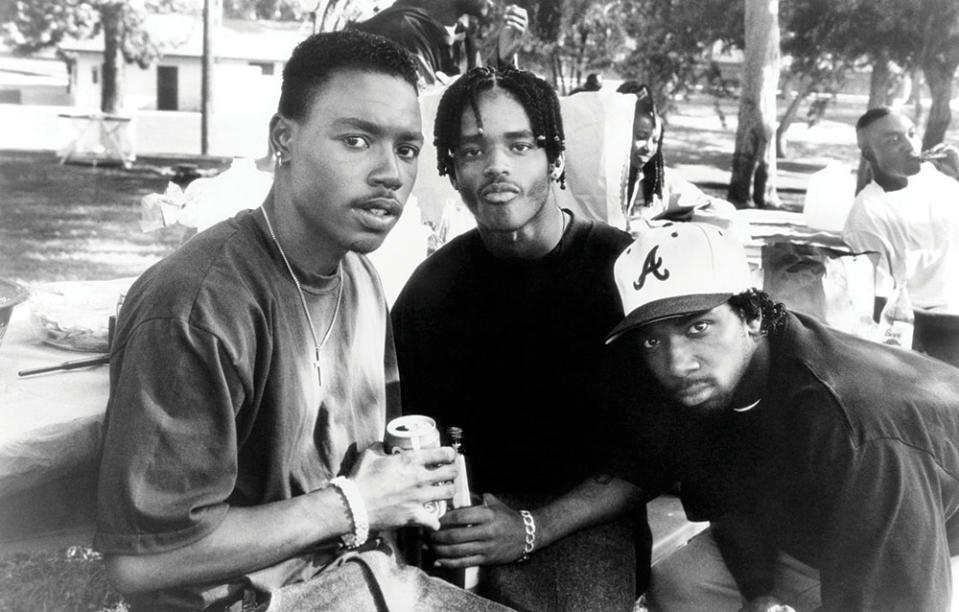
This is a great conversation, I hate to interrupt. I’m just curious about when you all were having such success in the ’90s, with Moesha or Waiting to Exhale or The Steve Harvey Show or Love Jones. Was there frustration in why the other community, the general community, wasn’t really acknowledging and seeing the success and the impact? Or were you so happy with the impact that you were having within the Black community?
TATE I’d like to jump in with that really quick. The thing that Nia Long and I always talk about is the impact that Love Jones had on the community. But based on Hollywood standards, it was not a box office success for New Line Cinema. They didn’t feel like it had done what other films had done, things that we had done previously, such as a Menace II Society that I had done with them.
And it kind of made us feel like, wow. I mean, if we had, once again, the right marketing strategies and the right marketing dollars, if we had the people who were at the top of the food chain making those decisions to treat this as if it were a Sleepless in Seattle, we could have had box office success. But at the end of the day, even though it may not have been a success financially at the time for Hollywood, it certainly became a classic for Black folks and it really was something that people can put into their classic cinema of love stories. And to be included in that is amazing. Then, opening up doors for other stories to be told, whether Love & Basketball, projects like Soul Food and things like that. It’s OK for Black folks to be in a movie where we’re not being hurt or no one is getting killed. The only thing getting hurt is maybe someone’s heart.
And it speaks to, once again, if you put our projects out there and we tell those stories in this authentic way, they’re going to survive the test of time. No matter what. And we can’t be deterred by the fact that it didn’t have a huge box office success, or we didn’t have the viewership for a TV show. If we continue to just tell our stories and find people who are in these positions to greenlight, once again, I think that really, really is important, and it would be certainly a part of our success.
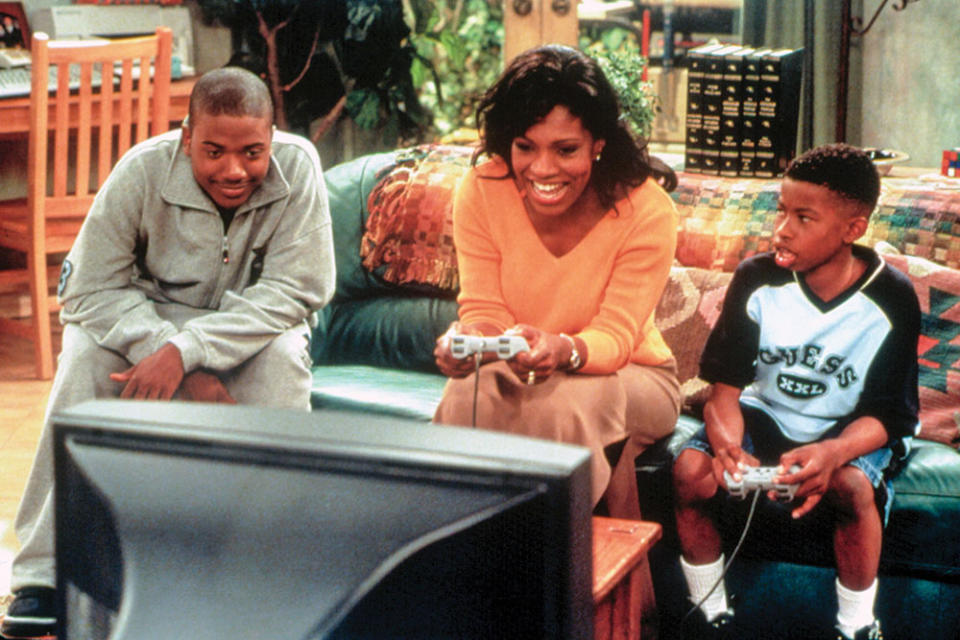
WHITFIELD I agree with you, because it is such a great honor for me to have such loyal people, audience members, who appreciate the work. The race of the person, yes, I would love to have the whole world, but if I have the honor of telling a story that will, as Larenz said, become a classic, something that’ll be played from generation to generation of my people — that, for me, is really exciting.
And yes, I want the whole world, but I love that there are generations who love Eve’s Bayou, that Kasi Lemmons’ work held up so. That a story that was so interesting was told, and will stand the test of time. And that year, it did do well. It was considered one of the best independent films of that year. And it got absolutely no Oscar play, with Jurnee Smollett and Meagan Good, I mean, the most dynamic young people. OK, but yet, still, it is a classic, and it will live on. One thing, because we don’t have as much programming that is ours, people hold on to our stories, and they never will let it go. And they’ll want their kids to watch it, and then it’s generational entertainment. For me, that’s really precious as well.
When Sheryl Lee’s in something, when Loretta is going to be in something, when all of us are in something, they are right there for us. It’s like, Larenz, he’s forever going to be a heartthrob. Because that is generational. It’s not going a damn step. It’s always going to be there. So the loyalty of that audience cannot be underestimated. We always want more, but I’m so grateful to have such a loyal audience, right?
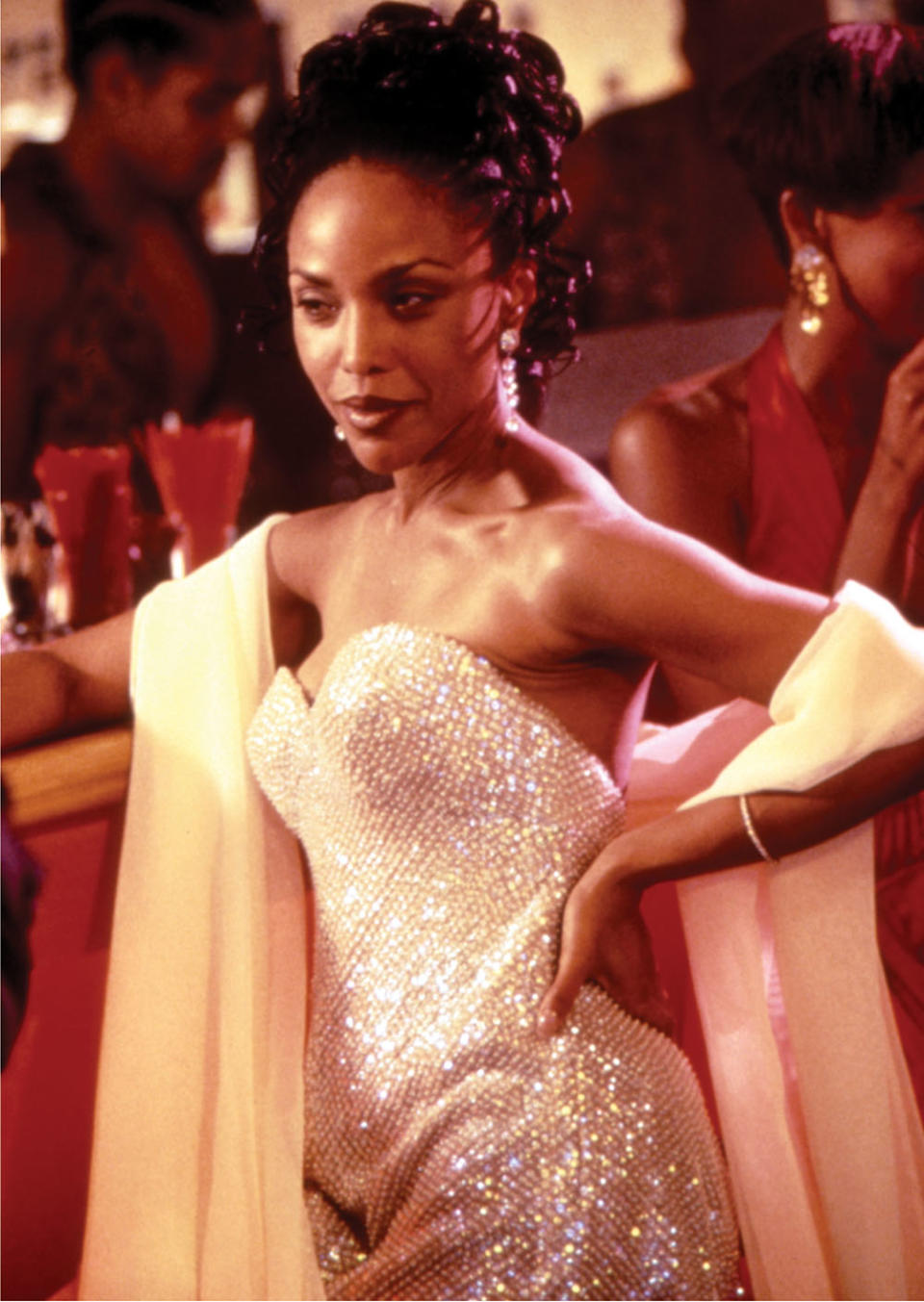
TATE I’m with you on that, Queen Lynn, because the thing about us being unapologetic about doing projects that are meant for us, there are things that are intentional. These are for us, this is a story about us. We ain’t trying to be like other cultures. We’re not trying to tell a remake, or create a remake of someone else’s journey. We want to specifically talk about ours, and we have to be unapologetic about that. So yes, our audiences and our community are certainly loyal to us as we are as loyal to them. And I’m good. I’m happy. I can continue to tell stories that really center on the Black experience for the rest of my life, because we are universal, as we speak. You know what I mean? So whoever sees it, fine, but it’s for us.
WHITFIELD Exactly. And there’s that piece of, we are Black people, so I don’t really have to talk about being Black all the time. I really enjoy just sharing a human experience. You know what I mean? This is like, “Ooh, that’s a Black story.” Well, what the hell is a Black [story]? Look, I’m a Black woman, and so if I get to do Lion in Winter, I’m like, hallelujah, one of my favorites. So we just are Black artists. That’s the color of our skin, that’s our race, culturally, who we are. But we are all capable of doing any kind of character, any kind of story. It doesn’t have to be …
ROBINSON … really Black.
WHITFIELD … Sometimes race is expansive, and many times it’s limiting for you to put that on it: This is a Black story. That is more frustrating to me than anything, because then, that’s the decided demographic, how it’s going to be marketed, how many dollars are going to be put into doing it. The thought process and business, I think, the economic mind, is like, “This is where this will be bought, and that’s where it will be marketed.” And sometimes, it just puts limitations up when there don’t need to be any.
RALPH Very often, where I find that the limitations are, they’re within certain people’s eyes who find it difficult to focus on Blackness, to actually see Blackness and value Blackness. We were all talking about Hollywood, which we all know is a machine. We know that there are certain agencies. We know that there are certain studios. We know that there are certain producers. We know that there are certain agents, certain managers, within this machine, to push the projects, to push the people, to push the ideas to the next level. And it is to get those eyes to be able to focus on something that is not just light, bright to white, but is dark to Black. And that is part of where the change is coming.
WHITFIELD But now don’t leave out cafe au lait, Sheryl. What’s wrong?
ROBINSON We love cafe au lait! (Laughter.) You know what was an interesting journey to me on The Steve Harvey Show, was working with two of the most prominent Kings of Comedy at one time, in an era where comedy was at a whole other level, between Steve Harvey and Cedric the Entertainer, and what they did, not only for television, but what they did for that particular show. I think it was interesting how The WB did pretty much market it just to one particular audience, but their value brought so much more. And I’ve got to say, it’s the fans, and it’s the culture that just rides so hard, and just really stands by, not only the artists, but the product that’s going out there. And it was a really magical time, going back to the ’90s and the early 2000s, and what was out there. Because it wasn’t that many shows, I could count them on pretty much one hand. There was Martin, In Living Color, Living Single, The Steve Harvey Show, Moesha. We were all right there, and we were the flagships for so many new networks.
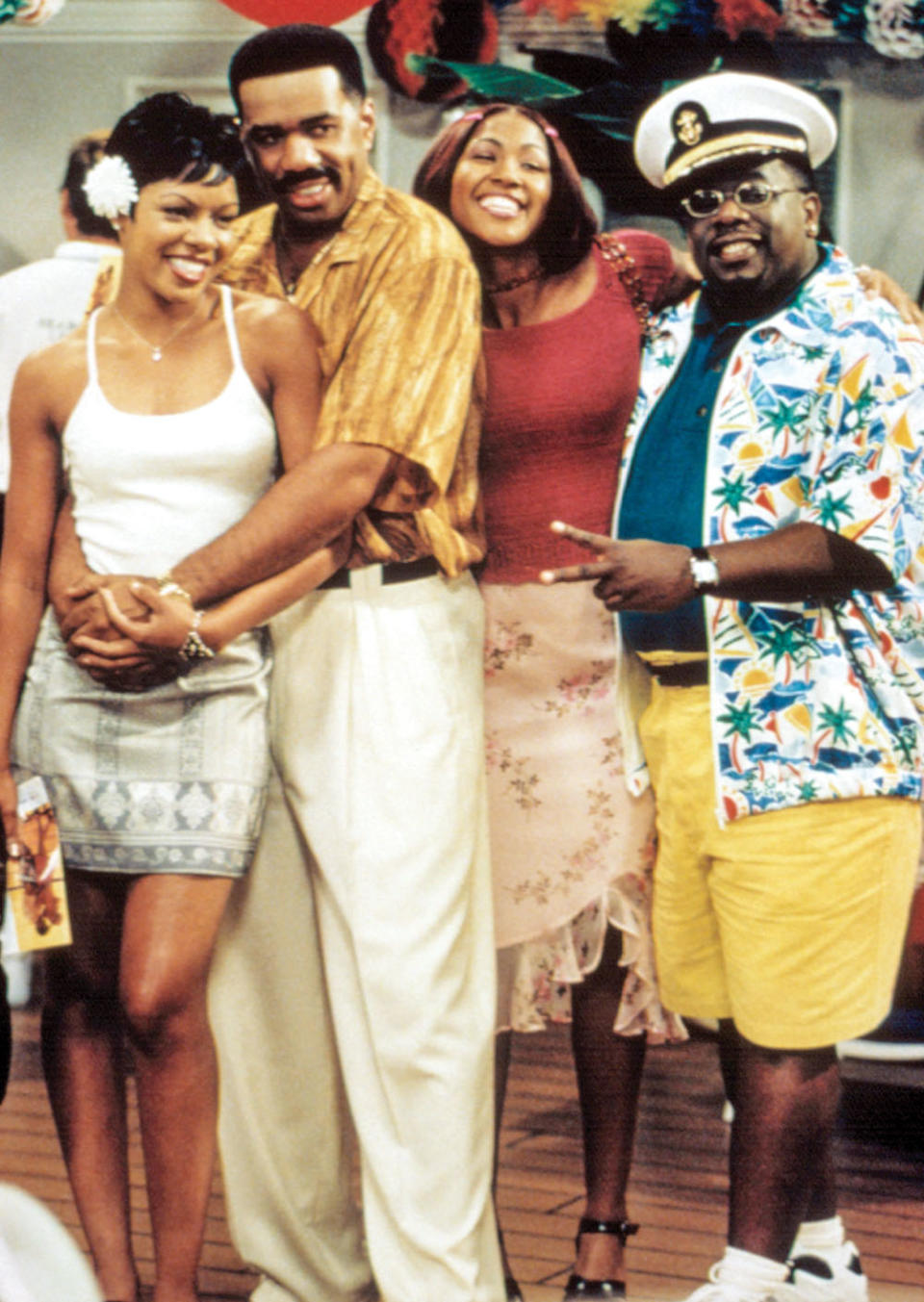
RALPH A Different World.
DEVINE A Different World.
ROBINSON Right, but we were the flagship shows for starting all these new networks, between UPN, The WB, all of that. And they put us out there, and we were just guiding and starting these new networks. And to see now where things are going, it’s quite interesting, and it’s like, OK, so now where are we?
WHITFIELD It’s interesting that you talked about comedy and Kings of Comedy, because when you look at how Will Smith transitioned from [comedy] …
RALPH Bernie Mac.
WHITFIELD … laughing is universal. And when you can pin and hang shows on music and comedy, it makes it a little bit easier for it to have a bigger life, a more universal audience.
RALPH Take a chance on, so to speak, yeah.
WHITFIELD Chris Rock has done a really good job of that. Richard Pryor did a great job with that.
RALPH Flip Wilson.
ROBINSON Oh gosh, yes.
RALPH Exactly. So there’s a lineage there.
WHITFIELD That it sort of transitions to larger audiences, though, goes back to the fame thing, because people love to laugh, right? So when you’ve got a concert series of comedy or music, and they have those audiences, then it expands the whole thing yet again.
RALPH It’s a universal language. It becomes colorless.
TATE An executive had told me that funny is money, and I don’t know why I didn’t listen to it. I stood in the dramatic line … and all the money is over there, and I’m over here …
RALPH No, dramatic is a magnet.
WHITFIELD You can go take those stand-up classes. Forget it, go do it.
TATE Oh, yeah, I’m about to get my funny bag on. I’m getting my funny bag so I can get this money.
RALPH You got it right now, Larenz. You got this.
I think what’s amazing about all of you is that you have also had such longevity. I’m sure being able to tell these Black stories has also helped with longevity, being in the center of those stories. And maybe you could speak a little bit to that, the longevity of your careers in being in Black spaces.
DEVINE Longevity. … You have to have a craft. It’s a craft. You have to get those lines down. You have to know how to work with another actor. You have to be good at what you do. And everybody here is very successful at doing what they know how to do.
RALPH Absolutely. It’s about relationships. When Loretta talks about longevity, it is about relationship, relationship, relationship. Who knows you? Who likes working with you? Who feels that you will add something wonderful to their set? And I can honestly say, I’m real good at this.
I remember [it] like it was yesterday. I was 19 years old when I started with Mr. Sidney Poitier in my first film, A Piece of the Action. And the way he mentored me and cared about the steps that I took in my career. Mr. Poitier said to me, “This industry has very little to offer you right now, but if you hone your craft, if you continue to study, if you continue to let them know that you are someone to be paid attention to, I expect great things from you.” And I’m sure each one of us has somebody that mentored us or told us something about our value and what we could add to this industry. Because if that didn’t happen, we would not keep going up against what we have to continue to go up against.
TATE Yeah, and we have to continue to celebrate those great icons, and those people who, as you said, worked so hard to build a way for us.
In some ways I feel like being Blackfamous has been enriching, because it has given you an opportunity to play a lot of different roles and have so much range. What is your relationship to the Black community and the roles that have done the most in your careers?
RALPH For me, I’d have to say, from Dreamgirls, to Moesha, to Sister Act 2, to Ray Donovan, to Motherland, to, now, Abbott Elementary, I thank my audiences for staying with me, hanging with me, and loving me from show to show to show. This has been probably one of the most amazing things that I have been able to be in an industry that I absolutely love, to do something that I would actually do for free. Thank God I don’t have to, but I’m so happy to be an artist, to have started where I started, to now be where I am, knowing it’s not the ending. And I thank my audience, and I thank my peers right here with me today. I am so grateful.
DEVINE Yes, I agree with Sheryl. I think we all feel that way, in so many ways. You appreciate it. You can go anywhere in L.A., at any airport, anywhere in the world, and we have an audience of all kinds of people now, because we are all over the world, thanks to all the new things that are happening on the internet, and Instagram, and Netflix, and all the stations that are around. And you have to thank your audience for loving you, because that makes all the difference.
ROBINSON Yes, I totally agree. I’m just so humbled, number one, to be in this company. Like I said before, I do want to leave with this. I always say, “Please and thank you.” I met with Mara Brock Akil when she was a PA on The Sinbad Show. And I was like, “What you doing here?” She’s like, “I’m just answering the phone.” She’s like, “But I’m a writer.” And I said, “Yes, you are. You are a writer.” Cut to 10 years later, she was the creator of, not only Girlfriends, but The Game. So I’ve just been trying to be very present. And so in that, I want to say thank you to all of the friends, fans, directors, producers, everybody. Thank you. Thank you.
TATE I’m grateful, just again, to be in the presence of [everyone here], and our community is so important. Everyone who has supported me since I was a little kid. People still remember some of the things that I had done early in my career, and to be able to still do what I love to do, I’m like, sure, I wouldn’t do it for free. I’ve got a wife and four kids I’ve got to take care of. Anyway, at the end of the day, I truly, truly am grateful to be able to be in an industry and do something that, really, I couldn’t imagine doing anything else, to be honest. And to have the support of not only my peers, but the community that is inside Hollywood and the entertainment industry. But more so just the community and the supporters around the world, certainly is a huge part of why I do what I do. So I’m grateful and thankful.
WHITFIELD I’m always fearful because I never wanted to be like, “Yeah, well when I was young girl, I did …” But I would like to say to the people who do love the stories, who do tune in, that it’s my passion and my honor to bring humanity to the screen, whether it be big or TV streaming. I take it seriously. It can be funny, but I never want to speak down to my audience. I’m so grateful for the support of the audience. I am grateful to the new audiences that come on, and I’m just still excited. I am a very excited storyteller, and I just want to tell stories that are interesting, authentic, and keep it moving, because I just have fun doing it. And it’s great. I think what we’re all saying is it is so lovely, such a blessing, to be able to actually really enjoy the work that we do. At the end of the day, the icing on the cake, when it is one of those successes, and it builds an audience, oh, as they say in the South, “I’m in high cotton now.”
ROBINSON High cotton. “Oh, you kissing in high cotton now.” Yes.
WHITFIELD Oh, this whole experience has been a high cotton experience. And I love y’all. I love the audience. Peace and blessings.
ROBINSON Keep shining. Keep shining, y’all.
WHITFIELD Loretta, tell them I want to be in P-Valley. I might even show a little something!
ROBINSON Tell 50 [Cent] I got five on it!
TATE OK. I got you. I got you.
Interview edited for length and clarity.
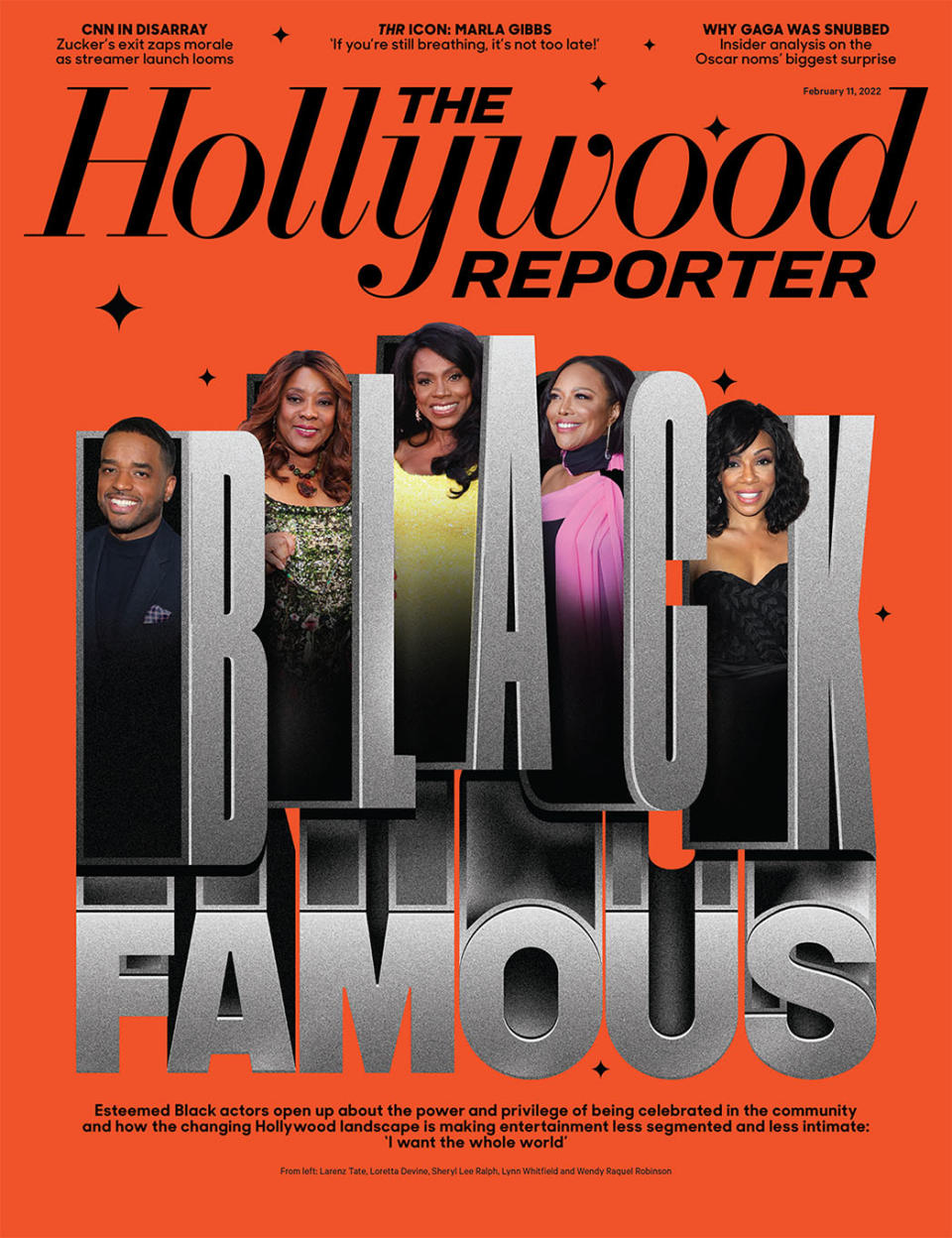
This story first appeared in the Feb. 11 issue of The Hollywood Reporter magazine. Click here to subscribe.
Best of The Hollywood Reporter

